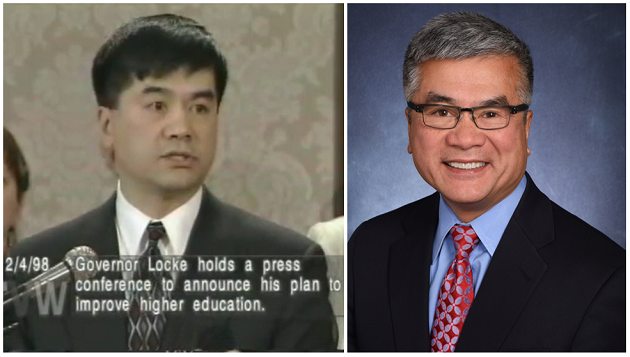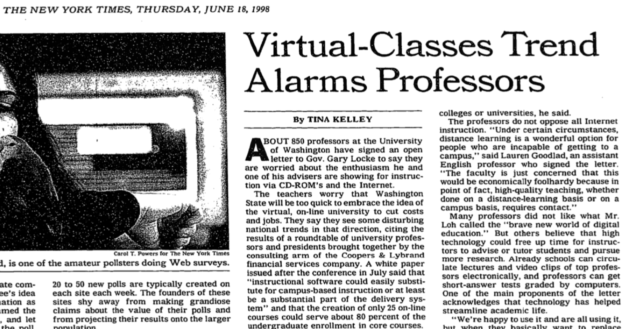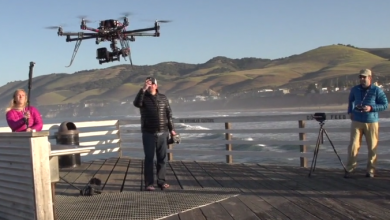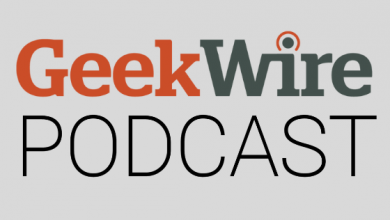This governor alarmed professors 22 years ago with his vision for distance learning in 2020 — here’s what he says today

A longtime contact of mine recently emailed a New York Times article from June 18, 1998: “Virtual-Classes Trend Alarms Professors.” Viewed through the lens of 2020, the headline was worthy of The Onion. But it got even better.
“About 850 professors at the University of Washington have signed an open letter to Gov. Gary Locke to say they are worried about the enthusiasm he and one of his advisers are showing for instruction via CD-ROM’s and the Internet,” the story read.
And here’s the kicker: This controversy focused on a group called the “2020 Commission,” created by Locke in 1998 to set a vision for higher education in some far-off year when, unbeknownst to anyone at the time, virtual classes would become a reality for professors and students around the world, like it or not.
If any story deserves revisiting right now, it’s this one.
So I got in touch with Locke, who was Washington state’s 21st governor from 1997–2005 before serving as U.S. Secretary of Commerce and later U.S. Ambassador to China during the Obama administration. It’s an especially timely topic right now for him, as a finalist to serve as interim president of Bellevue College in the Seattle area.
On this episode of the GeekWire Podcast, we look back at a pivotal debate over online education, more than two decades ago, and consider the implications for the very different world in which we’re living and learning today.
Listen above, or subscribe in any podcast app, and keep reading for more.
With the advantage of 22 years of hindsight, Locke chuckled over the 1998 New York Times story’s first sentence. But beyond that, Locke said he and the professors were actually on the same page, then and now.
“I’ve always been a major proponent of that personal interaction between the faculty and the students,” he said. “Clearly, using technology can make it easier for both faculty and students. But there’s still no substitute for that human interaction.”
So what caused the controversy? Looking back, it was a speech delivered by Locke to some of the state’s top high-school students in April of that same year. In that speech, he called for “a society that values competence rather than educational brand names,” and an approach that emphasizes lifelong learning rather than “prestige, or academic pedigree.”
That was the spark that lit the fire. The open letter, which was ultimately signed by more than 900 UW professors, said that Locke “made the surprising claim that the research university and its national prestige are *irrelevant* to a coming ‘Information Age’ in which Washingtonians will simply buy their ‘knowledge’ in ‘bite-sized’ chunks through private technology.”
“Our state’s future depends upon providing increased access to affordable, high-quality public education,” read the open letter. “But there are signs that those charged with designing the future of our community colleges and universities are heading in disturbing directions.”
Galya Diment, a professor of Slavic Languages & Literatures at the University of Washington, was president of the UW chapter of the American Association of University Professors at the time. She was quoted in the New York Times story, saying of technology: ”We’re happy to use it and are all using it, but when they basically want to replace people with computers, that’s where we draw the line.”
Reached by phone this week, Diment recalled, “Part of it was concern about our jobs, because we felt that it was being done as a budget-cutting ploy, but the whole notion of not having in-person communication with the students was horrifying.”
As an example of the ongoing pitfalls of online classes, she pointed to an anecdote that has circulated on social media, about a professor who gave an entire lecture on mute and didn’t notice the more than 200 comments from the students telling him that his audio was off.
“Now, you don’t have to convince anyone that [online instruction] is much worse than in-person teaching,” she said. “You just have to convince people that, when necessary, it is good enough. And that’s a really interesting reversal of the argument.”
The final report from the 2020 Commission didn’t go as far as the professors feared. One of its recommendations, for example, was to designate “a statewide coordinator who will make distance education easy to use.”
As stated in the report, a core tenet of the vision was to ensure that anyone who seeks to learn can learn, “and the result is a culture that honors learning, teaching and research more highly than before.”
Elements of that vision have been met, but with “a huge asterisk,” given inequitable access to broadband and technology, said Frank Catalano, education technology industry consultant and longtime GeekWire collaborator.
Now, Catalano said, the pandemic has pushed many post-secondary instructors “into the deep end of the distance learning pool.”
“Fall 2020 will not be the same as fall 2019, and what institutions do will not be parallel,” he said. “We’ve entered a time of great and frightening experimentation with online learning, and there will be some instructors and institutions that barely tread water, others that develop an Olympics-worthy backstroke, and probably not just a few who sink to the bottom — and take their students with them.”
Locke pointed out this week that the commission’s report was about much more than distance learning, putting a significant focus on funding.
However, the former governor said his larger point about virtual classes hasn’t changed: in-person instruction will play an enduring role in the experience of learning, but technology can be a valuable tool to extend the reach of education.
Audio editing and production by Curt Milton. Music by Daniel L.K. Caldwell.
Conclusion: So above is the This governor alarmed professors 22 years ago with his vision for distance learning in 2020 — here’s what he says today article. Hopefully with this article you can help you in life, always follow and read our good articles on the website: Ngoinhanho101.com






